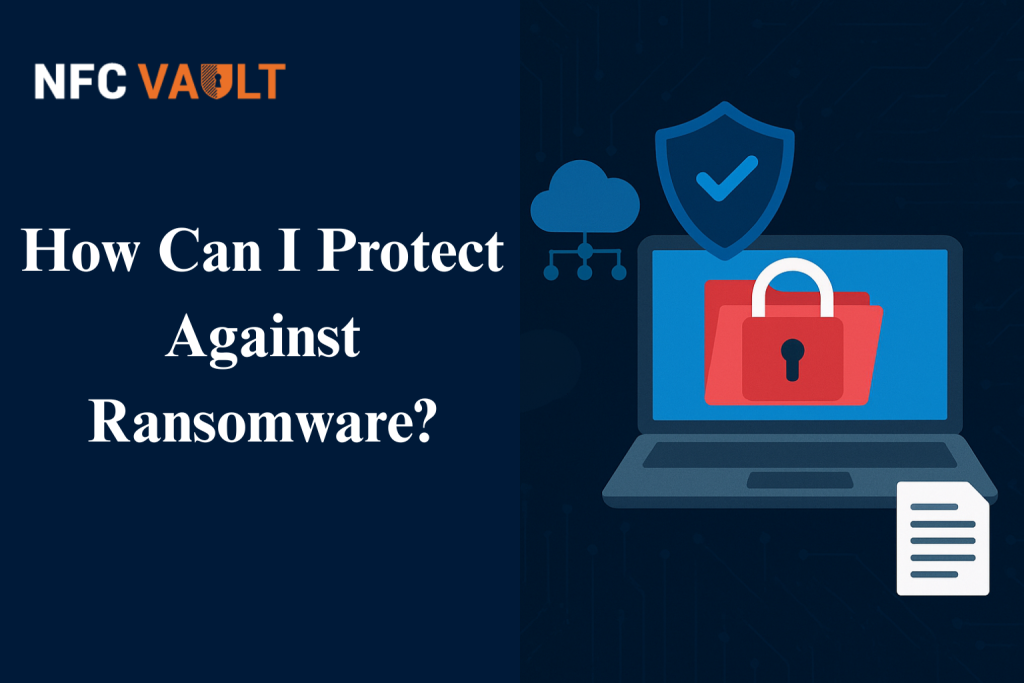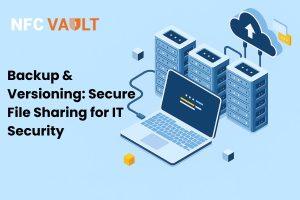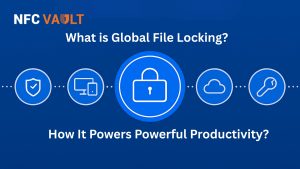Ransomware is one of the most dangerous cybersecurity threats that businesses are facing today. It encrypts your critical data, also locks you out, and denies payment for restoration. In some cases, even after payment, businesses do not recover their files which leads to financial loss, downtime, and damaged reputation.
As remote work, multi-site collaboration, and cloud migration are growing today, they are increasing the attack surface, making it essential for companies to have secure file sharing solutions and ransomware protection in place.
And here NFC Vault, an end-to-end encrypted file sharing and data management platform, has become a game changer for businesses that value data security, compliance, and productivity.
Understanding of Ransomware and its effects
Ransomware is a type of malicious software that gains unauthorized access to your networks through phishing, unsecured VPN, weak Active Directory Integration, or unpatched systems.
It encrypts your important files as well, often stored on your file sharing servers and Windows file servers.
Demands payment in cryptocurrency for the decryption key.
Impact on businesses
- Losing access to file shares: Employees cannot access shared drives or collaborate.
- Downtime: Stop operations until files are restored
- Compliance risk: Non-compliance risk with HIPAA, GDPR, or industry standards.
- Financial damage: Ransoms, recovery costs, and legal fees add up quickly.
Why cloud storage and secure file sharing are the primary defense
In today’s modern cyber threat environment, relying solely on traditional Windows file sharing or NTFS-based servers is not enough.
- Businesses need secure cloud file sharing solutions that provide:
- End-to-end encryption
- Versioning and backup
- Global file locking (so only one person can work on a file at a time)
- Local caching and offline access (work continues even when there is no internet connection)
- Multi-factor authentication (MFA) and single sign-on (SSO) for access control
NFC Vault provides all of these features on a single platform, reducing ransomware risks and increasing the efficiency of file access and sharing.
Proven Strategies to Protect Against Ransomware
- Use an End-to-End Encrypted Cloud Storage Solution
By storing files on a secure cloud file sharing platform (such as an NFC Vault) you ensure that even if hackers gain access to the system, they will not be able to read the data because it is encrypted.
- Implement Global File Locking
Global file locking allows only one user to edit a document at a time, so that malicious file changes from corruption or ransomware are not made.
- Enable Versioning & Backup
Versioning & backup lets you instantly roll back files to a secure version, without paying ransom. NFC Vault stores multiple versions securely in the cloud.
- Use Drive Mapping for Easy Access
Drive mapping lets you access cloud files like a local Windows file server, without traditional vulnerabilities.
- Leverage Local Caching & Offline Access
When the internet is down, files can be opened, edited, saved through local caching and synced when the internet is back. This reduces downtime in ransomware attacks.
- Strengthen Access Controls with SSO & MFA
Compromised credentials are a major reason for ransomware. NFC Vault supports Single Sign-On (SSO) & Multi-Factor Authentication (MFA) which prevents unauthorized logins.
- Replace VPN with secure internet file server access
Instead of exposing the network via VPN, NFC Vault provides encrypted remote access, completely eliminating the path for ransomware attacks.
- Active Directory integration for centralized control
Through Active Directory Integration, you can manage access permissions, enforce policies, and instantly revoke access to any compromised accounts.
- Support virtual meeting access and collaboration
In addition to file sharing, NFC Vault also integrates virtual meeting access so teams can collaborate without switching platforms.
- Choose a HIPAA-compliant, self-hosted solution for sensitive data
If your business handles healthcare or regulated data, NFC Vault provides HIPAA-compliant secure file sharing that can also be self-hosted.
Why NFC Vault is the best secure file sharing solution for businesses
Compared to Dropbox or simple cloud storage, NFC Vault offers enterprise-grade security and advanced data management features.
Security Features:
- End-to-end encrypted file sharing
- Global file locking for ransomware protection
- Versioning and backup for instant recovery
- Secure cloud file sharing for businesses
- Multi-site file collaboration without VPN
Data Management Features:
- Active Directory Integration
- NTFS permission mapping for Windows file sharing compatibility
- File access and sharing logs for audit
- Cloud migration support
Cloud migration: moving from vulnerable servers to NFC Vault
If you’re still using traditional Windows file servers or wondering “what is Windows file sharing?”, it’s time to upgrade.
Benefits of NFC Vault migration:
- Ransomware protection with secure cloud storage solutions
- Offline access and local caching for business continuity
- The most secure file sharing service for business
Ransomware Recovery: How NFC Vault Helps After an Attack
Attack on:
- Disconnect infected devices from the network.
- Access secure cloud file sharing from unaffected devices.
- By restoring clean copies from versioning & backup.
- Check file access logs to find the breach source.
NFC Vault ransomware protection minimizes downtime and keeps data safe.
Final Thoughts: Building Ransomware Resilience with NFC Vault
In the digital realm of today, ransomware attack is not a question of “if”; it is a question of “when.” Safeguard your business through a secure file sharing server by way of end-to-end encryption, ransomware protection, and advanced data management features.
NFC Vault provides the highest level of defense against ransomware by interlinking cloud storage, secure file sharing, and enterprise-grade security within one platform.
You can also read this blog: What is a Data Management Platform (DMP)?
FAQs
Q1: Can cloud storage protect against ransomware?
Yes, if it offers encryption, versioning, and secure file sharing solutions for businesses like NFC Vault.
Q2: How does global file locking help?
It prevents ransomware from corrupting files by ensuring only one user can edit at a time.
Q3: Is VPN still necessary for file access?
Not with NFC Vault’s internet file server and encrypted connections, making VPN optional.
Q4: Is NFC Vault HIPAA compliant?
Yes. It offers secure file sharing HIPAA compliant for business.



